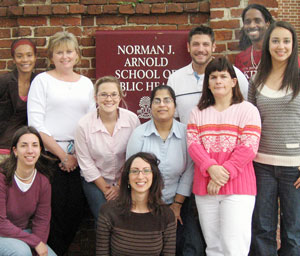


|
|
|
|
|
|
|
|
|
|
|
|
||||||||||||||
|
||||||||||||||
|
|
||||||||||||||
|
||||||||||||||
|
Posted 3/20/2008 Dr. Daniela Friedman's communication class to promote environmental and public health awareness A team of Arnold School of Public Health graduate students will mount a communications effort in April to promote recycling and raise the public health awareness of Columbia residents and the USC community. Students, being mentored by Dr. Daniela Friedman, an assistant professor in the Department of Health Promotion, Education, and Behavior, will kick off their activities on April 1. This is one of 19 similar efforts across the U.S. sanctioned and financially supported by the Association of Schools of Public Health (ASPH).
The "This is Public Health" Campaign Challenge asked students at ASPH member schools across the country to develop communications campaigns that help raise awareness about the effect of public health in our everyday lives. "The Role of Public Health in Promoting a Healthy Environment" is the name of the USC program. The USC graduate student team, enrolled in Friedman’s Applied Health Communication course, consists of Leanne Bailey, Nancy Chase, Gregory Dominick, Ella Ashley Fleming, Diana Marquez, Stacy Smallwood, Manju Tanwar, Amy Trepal, and Helene Vilme. Together they developed the concept and co-wrote the application. Community and USC partners on this project are the South Carolina Public Health Association, the South Carolina Public Health Consortium, Healthy Carolina, and the Southeast Branch of the Richland County Public Library.
In their application to the ASPH, the students noted that the quantity of waste and pollution is extremely high in South Carolina. According to the South Carolina Department of Health and Environmental Control, 3.2 million tons of solid wastes were placed in landfills in 2006 while 1.5 million tons were recycled. The students will launch the campaign at the South Carolina Public Health Association's (SCPHA) Public Health Month Kick-Off at the State Museum. They will mingle with attendees, talk about the important of recycling, and distribute recycling bins featuring "This is Public Health" stickers and materials from DHEC and other sources. Through surveys, attendees will be asked about their recycling habits and knowledge/awareness about the connection between the environment and public health. They also will be sent follow-up surveys to determine their knowledge and behaviors (e.g., recycling, reusing bags) after the Kick-Off and National Public Health Month. National Public Health Week, April 7-13, will be the occasion for a similar promotion at the Richland County Public Library, Southeast Branch. Also during National Public Health Week, a large display table featuring the "This is Public Health" logo, stickers, postcards, and posters will be set up in the Russell House. Additional recycling bins and promotional efforts will take place in Arnold School buildings. Local commercial and USC media will carry the "This is Public Health" message, beginning a week prior and continuing during National Public Health Week. Media outlets will include local TV stations, the USC and Arnold School websites, USC residence television, the Gamecock student newspaper, SCPHA newsletter, and student, faculty, and staff e-mail listservs. Friedman says this is a fantastic opportunity for students to apply their health communication coursework to development and implementation of an actual campaign. "As evident from their strong campaign proposal, the USC student team is enthusiastic and well prepared to spread the message about the ubiquitous nature of public health in our daily lives. Please stay tuned for upcoming 'This is Public Health' messages and events at the university and across Columbia." The students’ campaign is based on a five-stage model of campaign development that stresses strategic planning, message promotion, community engagement, community education, and partnership development. |
| Columbia, SC 29208 • 803-777-7000 • sphweb@gwm.sc.edu | © University of South Carolina Board of Trustees |

 The ASPH approved a $2000 budget for the campaign to pay for reusable
grocery/book bags, recycling bins, multi-media advertisements, draw
prizes for students and community members, and other materials which
will feature the "This is Public Health” logo.
The ASPH approved a $2000 budget for the campaign to pay for reusable
grocery/book bags, recycling bins, multi-media advertisements, draw
prizes for students and community members, and other materials which
will feature the "This is Public Health” logo.